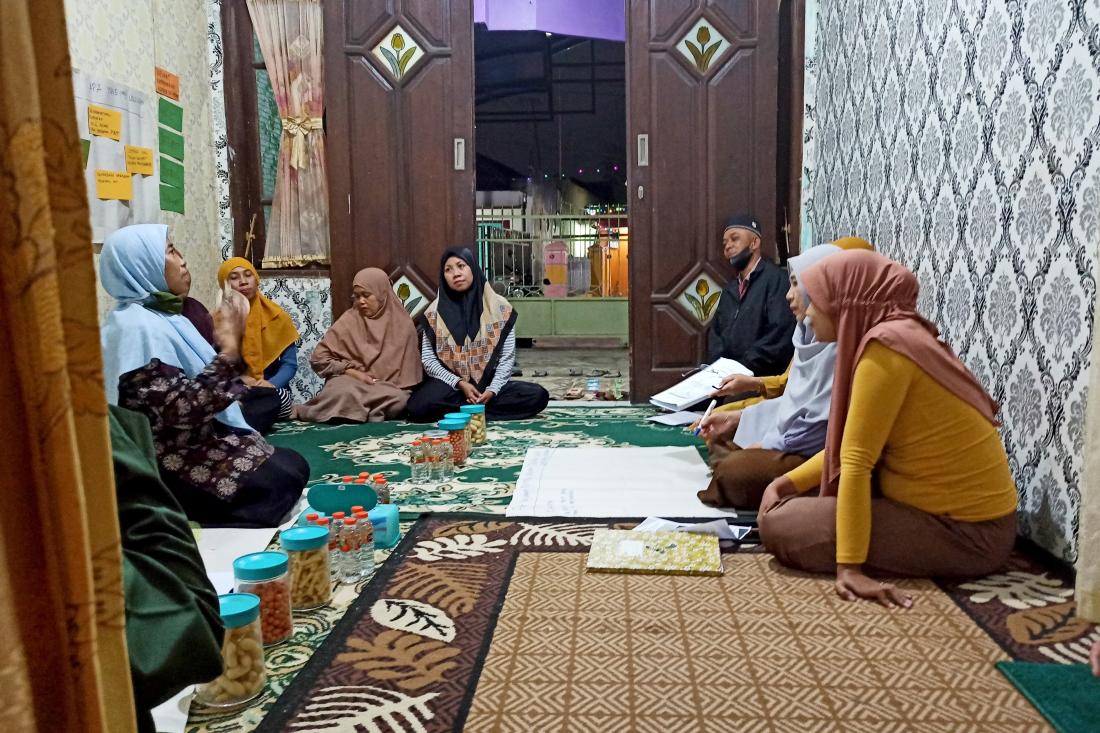Increasing Women’s Local Political Participation Through Top-Down and Bottom-Up Training in Indonesia
- Civil servants
- Women and girls
- Empowerment
- Elected Official Performance
- Self-esteem/self-efficacy
- Gender attitudes and norms
- Information
- Training
- Soft skills
- Empowerment training
- Norms change
When women are underrepresented in policymaking, governments may construct biased budgets and societies that serve men’s interests. In many countries, women's interests remain underrepresented in local policymaking despite gender quotas in legislative bodies. A J-PAL funded researcher conducted a randomized evaluation in Malang, East Java, Indonesia to test the impact of gender-focused interventions on female participation in neighborhood associations, known as rukun tetangga (RT), by comparing the effectiveness of empowerment training for female citizens and training for male council chairs.
Policy issue
Despite several efforts around the world to include and empower women in politics, in many countries, local policymaking does not always represent women’s interests. Without this women representation, governments may construct different budgets and societies. Previous research notes that men typically advocate for budget allocation toward infrastructure and agriculture projects, while female political interests typically center around health, access to clean water, and poverty alleviation.
While some countries have adopted laws that mandate a certain number of seats be reserved for women, these measures do not guarantee that women’s interests will be heard. Other programs that aim to increase women’s knowledge and participation do not necessarily increase the responsiveness of government officials to women’s requests. Studies that examine the effectiveness of such interventions are difficult to compare across different political and cultural contexts and there is little evidence on whether training male community leaders in addition to female community members is important to increase opportunities for women’s participation in local governance.
Can a collective efficacy training for neighborhood women’s groups increase women’s participation in community decision-making? Is there any additional impact of educating male community leaders to be more inclusive of women’s political participation?
Context of the evaluation
In Indonesia, neighborhood associations, known as rukun tetangga (RT), serve as the most local touchpoint between citizens and their government. RTs are comprised of around thirty to fifty households, and the councils are governed by an RT chair, who is typically a married man. The RT meetings are typically only for men or heavily influenced by men. The RT chair then brings his neighborhood’s priorities to the larger village meetings, in which the village plan and budget are determined for the 3,000-10,000 residents across all neighborhoods. The RT chairs may also network with village officials to advocate for their concerns.
To increase the autonomy of village governments and standardize opportunities for community input in village governance, the Indonesian government passed the 2014 Village Law. The law includes larger transfers of funds to villages for village governments and requirements for village governments to hold community consultations to inform village development plans and budgets, including a 30 percent quota for female attendance in such consultations. Despite this reform, political leaders continue to be overwhelmingly male at both the neighborhood and village levels and women’s preferences remain underrepresented.
Women in neighborhoods often belong to all-female groups which meet regularly for rotating savings (arisan) and religious activities (yasinan). These groups also serve as social outlets but are not integrated into local budgeting or political activities. The arisan chair is often the wife of the RT chair, although she and the other women rarely attend the RT meetings except to prepare food. Many regencies in Indonesia have similar structures and gender norms to the Malang regency in East Java, where this study takes place.
The evaluation team partnered with the Malang branch of a national NGO, PATTIRO, to deliver the trainings. PATTIRO has been involved in improving local governance and citizen participation initiatives since 2004. The Malang office has created resource hubs and managed both training and research to improve public engagement and accountability in local government.

Details of the intervention
In partnership with PATTIRO, researchers conducted a randomized evaluation to test the impact of gender-focused trainings on female participation in neighborhood associations in the Malang regency, East Java, Indonesia. Researchers randomly assigned 100 Rakun Warga (RW), groups of three to five neighborhoods on average, including 300 neighborhoods in total across 15 villages to three different intervention groups:
- Placebo (50 RW including 150 neighborhoods): Arisan groups received financial literacy training and the RT chair received entrepreneurship training. This group served as the study’s comparison group.
- Arisan only (25 RW including 75 neighborhoods): Arisan groups received the empowerment and political skills training, and the RT chair received the budgeting training.
- Arisan + RT (25 RW including 75 neighborhoods): Participants in this group received the same training as the arisan groups plus a gender inclusion training for the RT and arisan chairs.
The arisan skills training focused on understanding of local governance, fostering a sense of shared identity, and creating strategies for effective collective action and communication with community leaders. The RT and arisan chair-targeted training focused on women's empowerment reforms, fostering inclusivity by design in neighborhood meetings, and promoting joint interactions with higher-level village officials. PATTIRO led the training sessions over the course of two months. The trainings were marketed as general community development leadership trainings rather than gender empowerment trainings.
Researchers will assess women’s participation through surveys with women community members and neighborhood leaders. The women’s survey includes an opportunity for women to share a proposal with their neighborhood association chair. Surveys for neighborhood association leaders measure perceptions of women’s participation and responsiveness to women’s concerns.
Results and policy lessons
Research ongoing; results forthcoming.
